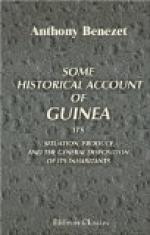“At my first arrival in Hispaniola, (added the bishop) it contained a million of inhabitants; and now (viz. in the space of about twenty years) there remains scarce the hundredth part of them; thousands have perished thro’ want, fatigue, merciless punishment, cruelty, and barbarity. If the blood of one man unjustly shed, calls loudly for vengeance; how strong must be the cry of that of so many unhappy creatures which is shedding daily?”—The good bishop concluded his speech, with imploring the King’s clemency for subjects so unjustly oppressed; and bravely declared, that heaven would one day call him to an account, for the numberless acts of cruelty which he might have prevented. The King applauded the bishop’s zeal; promised to second it; but so many of the great ones had an interest in continuing the oppression, that nothing was done; so that all the Indians in Hispaniola, except a few who had hid themselves in the most inaccessible mountains, were destroyed.
CHAP. V.
First account of the English trading to Guinea. Thomas Windham and several others go to that coast. Some of the Negroes carried off by the English. Queen Elizabeth’s charge to Captain Hawkins respecting the natives. Nevertheless he goes on the coast and carries off some of the Negroes. Patents are granted. The King of France objects to the Negroes being kept in slavery. As do the college of Cardinals at Rome. The natives, an inoffensive people; corrupted by the Europeans. The sentiments of the natives concerning the slave-trade, from William Smith: Confirmed by Andrew Brue and James Barbot.




